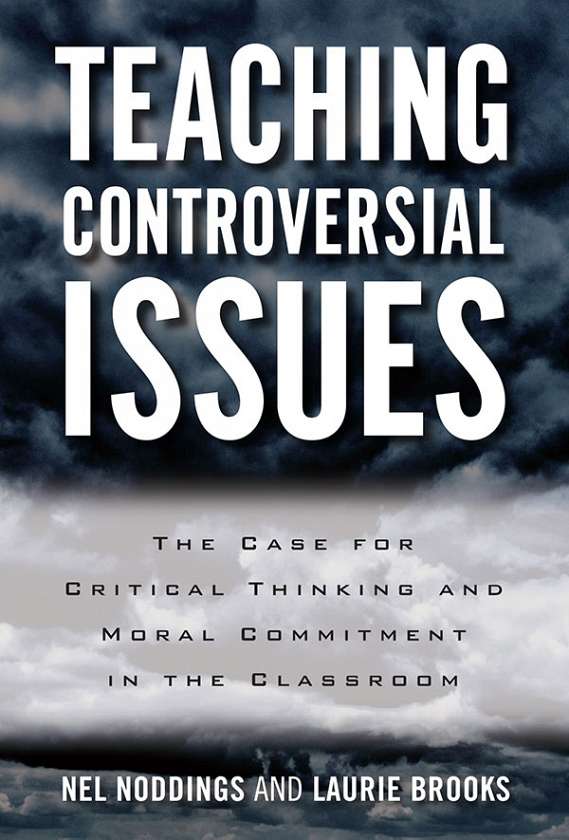Professors: Request an Exam Copy
Print copies available for US orders only. For orders outside the US, see our international distributors.
Publication Date: December 16, 2016
Pages: 192

2018 Delta Kappa Gamma Educators Book Award
In this book, eminent educational philosopher Nel Noddings and daughter Laurie Brooks explain how teachers can foster critical thinking through the exploration of controversial issues. The emphasis is on the use of critical thinking to understand and collaborate, not simply to win arguments. The authors describe how critical thinking that encourages dialogue across the school disciplines and across social/economic classes prepares students for participation in democracy. They offer specific, concrete strategies for addressing a variety of issues related to authority, religion, gender, race, media, sports, entertainment, class and poverty, capitalism and socialism, and equality and justice. The goal is to develop individuals who can examine their own beliefs, those of their own and other groups, and those of their nation, and can do so with respect and understanding for others' values.
Book Features:
Nel Noddings is Lee Jacks Professor of Education, Emerita, at Stanford University. Her books include Education and Democracy in the 21st Century, When School Reform Goes Wrong, The Challenge to Care in Schools, Educating Citizens for Global Awareness, Educating for Intelligent Belief or Unbelief, and Educating Moral People. Laurie Brooks is on the board of Provident Financial Services and serves on advisory boards for programs at North Carolina State and Rutgers Universities.
"Not only can the book serve as a primer supporting and spurring educators to address controversial issues while teaching, it can also inspire critical thinking and questioning among colleagues in schools, districts, and preparation programs."
—Teachers College Record
"Accessible and interesting to classroom teachers, teacher educators, and anyone interested in a thoughtful breakdown of issues vital to a functioning democracy through a unique lens."
—Theory and Research in Social Education
"As a European, I found the information given in the discussion of the controversial issues very interesting. Noddings and Brooks offer an exciting eight-chapter short course on current North-American society and history. I think that this alone makes the book worth reading for non-Americans in order for them to get a snapshot of North-American society and to understand some of its recent developments, but I also believe that North-Americans can profit from reading the book."
—Science & Education
“Brilliant! This is a book that all educators and parents should read. Noddings and Brooks—well known in their respective fields, and also a mother/daughter team—make a strong and persuasive case for the fundamental need to develop critical thinking that starts in the elementary school in order to nurture moral commitment among students. They paint a landscape that outlines the pressing topics (such as religion, race, gender, equity, justice, and freedom) facing society today. They carefully trace the historical roots of these, outline the current issues and, with practical suggestions, show how they might be addressed in classrooms. They make compelling arguments in addressing why such topics need to be integrated across the curriculum and how critical thinking is so central in developing a thoughtful moral imperative in which society can survive and thrive.”
—Lynn Butler-Krisber, McGill University
"One of the most common mistakes about good teachers is that they avoid controversy and open moral commitment. Noddings and Brooks not only show why this is a mistake, they also show how teachers can engage controversy and express their moral values in an educationally inspiring way. This is a brilliant and timely book that will transform how many readers will think about what good teaching can accomplish."
—Eamonn K. Callan, Stanford University
“Brooks and Noddings offer a timely and inspirational guide for teaching critical thinking in American schools. With deep roots in American philosophy and traditions, this book inspires us to teach students to question authority while fostering meaningful conversations about the difficult issues confronting our nation. This book offers a recipe for nurturing the next generation of caring and critical democratic citizens.”
—Andrew Fiala, professor, California State University, Fresno
“With thoughtful and accessible prose, Noddings and Brooks explore the fundamental, “hot button” issues that course through our history—religion and race, equality and justice, poverty and patriotism, capitalism and class—helping readers understand the profound connections between critical thinking and moral commitment. Chock-full of contemporary and historical examples, their book offers educators myriad examples of how to help students learn to talk with and listen to others and to understand the fullness of our collective humanity.”
—Suzanne M. Wilson, University of Connecticut
2018 Delta Kappa Gamma Educators Book Award
2017 AESA Critics’ Choice Book Award
Table of Contents
Acknowledgments
Introduction
Chapter 1. The Sources of Morality
The Classical Influence
Character Education
Reason
Passions and Feeling
Related Political Considerations
Chapter 2. Authority
Childhood and Choice
Participatory Democracy in Schools
The Dangers of Obedience
Civil Disobedience
Chapter 3. Critical Thinking
Developing the Basics
The Search for Meaning Deepens
Critical Thinking and Moral Commitment
The Media Threat
Chapter 4. Religion
Belief and Unbelief
Religion, Slavery, and Women's Rights
Evolution
Freedom, Choice, and Commitment
Chapter 5. Race
Facing Our History
Race Today
Race in Today's Schools
Chapter 6. Gender and Public Life
Women's Thought in Defining Our World
Progress by the Numbers
Why Are the Numbers So Low? Women in the STEM Professions
How Might We Measure Equality?
What Has Been Done to Further Equality?
Why Are the Numbers So Low? Women in Entertainment
Chapter 7. Entertainment, Sports, and Media
Entertainment
Sports
Media
Chapter 8. Capitalism and Socialism
Capitalism
Socialism
What Schools Can Do
Chapter 9. Money, Class, and Poverty
Money
Class
Poverty
Global Economic and Environmental Issues
Chapter 10. Equality, Justice, and Freedom
Equality
Justice
Freedom
Revisiting Equality
Chapter 11. Patriotism
Preliminary Teacher Talk
The Military and Patriotic Feeling
Who Are We?
Must America Be Great?
Global Patriotism
Chapter 12. Moral Commitment
References
Index
About the Author
Professors: Request an Exam Copy
Print copies available for US orders only. For orders outside the US, see our international distributors.